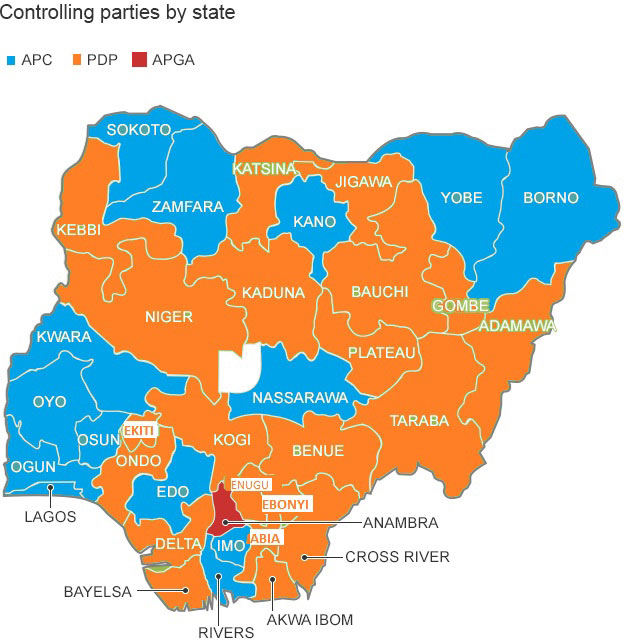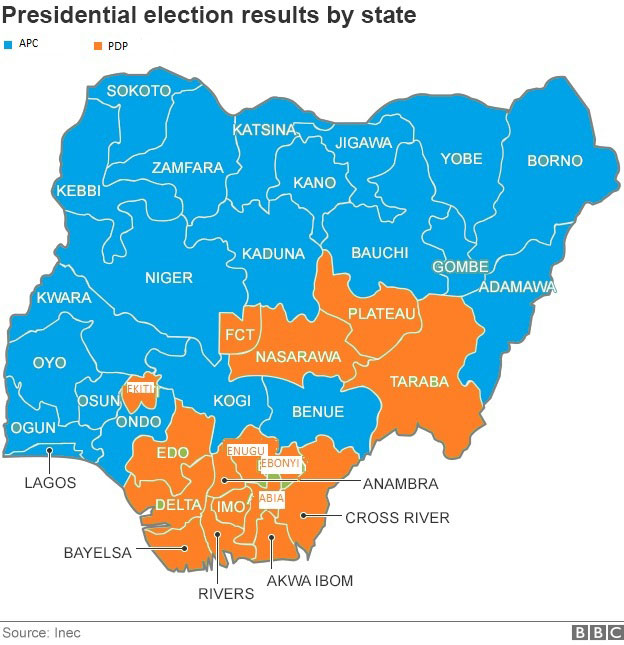Web article: Nigeria: Presidential Election 28 March 2015
-

Muhammadu Buhari, winner of the 2015
elections.
By ASC researcher Akinyinka Akinyoade.
In fulfilment of its core mandate to ‘Organize, undertake and supervise all elections to the offices of the President and Vice-president’, Nigeria’s Independent National Electoral Commission (INEC) on 28 March 2015 conducted elections on a national scale to arrive at a candidate that will be sworn in as President of Nigeria for a 4-year tenure of office. The maximum limit of tenure of office is two. Section 25 of Nigeria’s Electoral Act, 2010 (as amended), provides that Commission to appoint date not earlier than 150 days but not later than 30 days before the expiration of the term of office of the last holder of that office. In accordance with this provision, Presidential & National Assembly elections, initially scheduled for February 14, was eventfully held on 28th March, 2015. There are 28 registered political parties; 14 of these fielded presidential candidates for the national elections. The two most prominent are the People’s Democratic Party (PDP) and All Progressives Congress (APC), respectively backing Goodluck Jonathan (incumbent President) and Muhammadu Buhari (former military ruler and 3-time democratic challenger). At the end of official announcement of results on Tuesday March 31, Muhammadu Buhari emerged as winner, and the out-going President Jonathan conceded defeat in a statement and congratulated the winner.
Statistics indicate that 67,422,005 voters were registered in Nigeria; 31,746,490 got accredited for the national elections, while 28,587,564 were valid votes cast. The valid votes represent 42.4% of all registered voters. Buhari obtained 15,424,921 (53.96%) of valid vote, and secured more than the mandatory minimum of 25% of valid votes in over 24 out of the 36 States of the Nigeria Federation, thus avoiding a run-off.
Nigeria returned to democratic governance in 1999 and has had four cycles of national and state elections since then (1999, 2003, 2007, 2011). The country also had shots at democracy in the early 1960s, late 1970s, and early 1990s; all with interesting experiences. But the 2015 national elections appear to outscore all in terms of drama, tension, politicking (propaganda, protests and counter-protests, visibility of royal and religious figures), humor, international engagement, alliance of opposition parties, voter registration, technology in voter accreditation, results, acceptance of results, and the mundane.
President-elect Muhammadu Buhari (17 December 1942) is a retired General of the Nigerian Army. He was the military ruler of Nigeria for a brief but memorable 20-month period in the 1980s (31 December 1983 to 27 August 1985). At that time, alongside his erstwhile deputy, the late Major-General Tunde Idiagbon, they instituted the famous War Against Indiscipline (WAI) programme for social order and worked to imports to address Nigeria’s balance of payments. Their regime was cut short by General Babangida; and it was not until 1999 that democratic governance was restored in Nigeria.
In the 2003 Presidential election, Buhari contested as the flag bearer of All Nigeria’s Peoples Party (ANPP); he lost to former President Obasanjo. He lost at two other election cycles: in 2007 still as ANPP candidate, and in 2011 as candidate of the Congress for Progressive Change (CPC); to late President Yaradua and outgoing President Jonathan respectively. He stated that he left the ANPP for CPC “as a solution to the debilitating ethical and ideological conflicts in…ANPP”. For the recently held elections, he and CPP entered into a political merger with ACN to form the APC for which he became the Presidential flag-bearer. He rides on the wave of mass appeal to anti-corruption[1] and at his fourth attempt, he has been voted as Nigeria’s President to be sworn-in for a 4-year term on 29 May 2015.
Figure 1: States controlled by different parties prior to March 28 presidential election

Source: BBC Online Pre-April 11 2015 Elections; http://www.bbc.com/news/world-africa-32261544
Figure 2: New configuration of states controlled by parties from March 28, 2015, presidential elections

(Source: Adapted from INEC figures and BBC online illustration, April 2015.)

(Click to enlarge. Source: Data collated from official results declared by INEC http://www.inecnigeria.org/?inecnews=2015-presidential-election-result-2)


